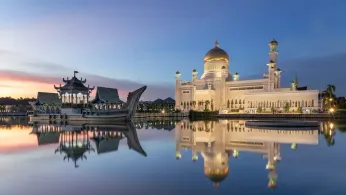
5 hours ago
Beneath the Sultan’s Palace: Queer Wanderlust in Brunei’s Hidden Corners
READ TIME: 4 MIN.
Brunei. The name alone conjures images of opulence — golden domes glinting in the equatorial sun, rainforest canopies stretching toward the sky, and the surreal calm of a country that seems to float on oil wealth and tradition. But for the queer traveler, Brunei is less a destination on the standard rainbow map and more an act of daring: a place where every step is both discovery and subtle defiance.
Arriving in Bandar Seri Begawan, Brunei’s capital, you’re greeted by the gentle hum of the city, the sweet scent of frangipani, and a palpable sense that everything — and everyone — is keeping secrets. The city’s famed Sultan Omar Ali Saifuddien Mosque rises like a mirage, as stunning as any cathedral but more guarded. Here, the beauty of Brunei is matched by the complexity of its soul — especially for those who love differently.
Let’s address the elephant in the room, draped in gold silk: Brunei’s laws are among the harshest in Southeast Asia for LGBTQ+ people. Same-sex sexual activity is illegal for both men and women, with penalties ranging from long prison sentences to corporal punishment, and the Syariah Penal Code includes the death penalty for male homosexuality — though no executions have been carried out in decades, and a moratorium announced in 2019 remains in effect (as of May 2023) . Still, the threat hangs heavy, and the LGBTQ+ community is compelled to live in the shadows, their identities kept secret even from family and friends.
“I felt like even chat rooms are filled with… hidden people and I’m scared they might just take me away once I get caught by them,” a gay Bruneian named S. told TIME, describing how even dating apps feel dangerous now . Physical spaces for queer gathering are rare, and most connections happen through coded glances, whispers, and careful online conversations.
Yet, where there is risk, there is resilience. The Brunei Project, a grassroots initiative founded in 2015, quietly advocates for human rights, including LGBTQ+ issues, often via social media and private events . In 2016, the country’s first International Day Against Homophobia was marked with a discreet gathering — a small, luminous act of community in a place where visibility can mean danger.
So, where do queer Bruneians go to celebrate life, love, and identity? The answer: underground, in the most literal and creative senses.
Nightlife, as you might expect, is subdued — there are no rainbow flags fluttering in the humid night, no bars advertising drag shows or queer dance parties. But the city’s cafes and quiet lounges sometimes double as meeting spots for those in the know. Look for venues with international clientele and quieter, artsy atmospheres: places like The Coffee Bean at the waterfront, or the tucked-away Little Soho, where creative types gather to talk art, music, and, in hushed tones, sometimes love .
Insider tip: If you’re seeking connection, observe the subtle codes of queer Bruneian life. A rainbow pin on a backpack, a knowing smile exchanged at a poetry reading, a whispered invitation to a private house party — these are the breadcrumbs of a community that exists mostly in private, behind closed doors.
Social media, especially encrypted messaging apps, play a vital role in organizing meetups and sharing information. Instagram accounts like @thebruneiproject (Instagram: @thebruneiproject) post updates on activism and international solidarity, while private Facebook groups connect those seeking support.
Despite the risks, queer icons and allies have emerged — often at great personal cost. Shahiran Shahrani, a Bruneian activist, was forced to seek asylum in Canada after criticizing the government’s crackdown on LGBTQ+ rights on social media; his story is a powerful testament to the courage of Brunei’s queer community .
Local allies include artists, educators, and progressive religious leaders who quietly support LGBTQ+ rights, even as public advocacy remains dangerous. In 2011, academics at the University of Brunei conducted a rare study of gay life, revealing a community that chooses silence and discretion to survive .
Travelers looking for queer-friendly spaces should seek out international hotels, wellness spas, and art galleries, which tend to be more welcoming of diverse identities. The Empire Hotel & Country Club, Brunei’s luxury resort, is known for its discretion and world-class hospitality — while not explicitly queer-friendly, its staff are trained to respect privacy and create a welcoming environment for all guests .
Art and cultural festivals, such as the Brunei Film Blitz, provide opportunities for connection and expression. Though programming steers clear of overt LGBTQ+ themes, queer artists sometimes find ways to slip coded messages into their work, creating a subtle dialogue for those who know how to listen.
Brunei’s complex relationship with queerness is deeply rooted in its history. Prior to independence in 1984, British colonial law criminalized homosexuality, and post-independence, the national ideology — Melayu Islam Beraja — reinforced conservative Islamic values . Today, the Sultan rules with near-absolute authority, and the media is tightly controlled, limiting public discussion of LGBTQ+ issues.
But Brunei’s queer history isn’t just about silence and repression; it’s also about adaptation and quiet resistance. Stories circulate of couples who found ways to be together, of friendships forged in adversity, and of small acts of kindness that sustain hope — even when the law insists on invisibility.
Insider Tips: How to Visit Brunei as a Queer Traveler
- Dress modestly and avoid public displays of affection, regardless of gender or orientation .
- Connect with local advocacy groups like The Brunei Project before you travel, for safety advice and possible meetups (Instagram: @thebruneiproject).
- Use encrypted messaging apps for private conversations and to arrange gatherings.
- Seek out international hotels and venues where privacy is respected.
- Respect local customs and laws, but don’t underestimate the power of a smile, a kind word, or a shared moment — these are the currencies of queer connection in Brunei.
Brunei is not easy, but it is unforgettable. To visit as a queer traveler is to step into a world of beauty and contradiction, where every moment is charged with meaning, and every connection — however brief or hidden — is an act of solidarity. Beneath the Sultan’s palace, love endures in the shadows, flickering like fireflies in the jungle night. Here, your presence is both witness and celebration, a reminder that queer joy survives even in the most unlikely places. Brunei may keep its rainbows hidden, but for those who look closely, the colors are always there — shimmering quietly, waiting to be discovered.






